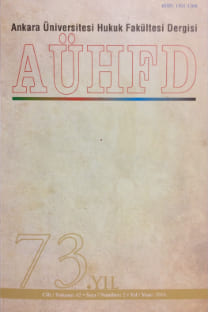Telekomünikasyon Direktifleri ve Türk Mevzuatıyla Bağlantısı
Avrupa Birliği, 1980’li yılların başlarından bu zamana kadar, pazarın liberalleştirilmesi, birleştirilerek tek bir sektör oluşturulması ve üye ülkelerin yasalarının uyumlu hale getirilmesi için telekomünikasyon sektöründe birçok reform yapmıştır. Avrupa Birliği’ne tam üye adayı olan Türkiye de Birliğin üyelik gerekliliklerini yerine getirebilmek için Ulusal Programında Avrupa Birliği üye ülkelerin yasalarına uyumluluk, pazarın tam liberalleşmeye hazırlanması, Avrupa Birliği yasalarına tam uygunluk için gereken çalışmaların yapılması ve bilişim teknolojisi altyapısının kurulması olmak üzere başlıca dört alanda yükümlülük üstlenmiştir. Buna karşın ulusal otorite belirtilen amaçlara ulaşmak için birçok düzenleme yapar ve iç pazarı belirli oranda liberalleştirirken, Avrupa Birliği’nin parçası olan ulusal organlar için temel bir soru ortada durmaktadır, verimliliği arttırmak ve iç pazarlardan uyumlu bir tek pazar yaratmak sistematik olarak yeni kural setleri üretmekle mümkün müdür? Görülmektedir ki, bu zamana kadar bu neviden üst yapı kurallarının kabulünde ve uygulanmasında ulusal otoritelerin yarattığı çeşitlilik ve farklılık ulusal operatörlerin hizmetlerini Avrupa’nın başka devletlerinde de sunması noktasında dezavantaj yaratmaktadır. Açıktır ki, bu tipte ortaya çıkan sorunlar yeni kurallar kabul edilerek çözülemez ve yeni bir yaklaşım tarzı gerekmektedir. Avrupa Birliği çapındaki bütün ulusal düzenleyici otoritelerin aynı çatı altında birleştirilmesi bu tipte sorunlar için etkin bir çözüm olacağı gibi topluluğun amaçlarına ulaşmasına da yardımcı olabilir
Anahtar Kelimeler:
Avrupa Birliği telekomünikasyon mevzuatı, Türk telekomünikasyon mevzuatı, Avrupa’da telekomünikasyon sektörünün düzenlenişi, düzenleyici otoriteler telekomünikasyon sektörünün liberalleştirilmesi, ulusal
TELECOMMUNICATION DIRECTIVES AND ITS RELATION TO TURKISH REGULATIONS
Many reforms took place in the European Union regarding the telecommunication sector, beginning from early 80’s to date, at the purposes of liberalization of the market, consolidating telecommunication sector and other related sectors as a single market and harmonizing the legislation of the member countries. As a candidate of the European Union membership, Turkey assumed four types of obligations within the framework of the national program about telecommunication sector in order to full fill membership requirements of the Union. The first of the mentioned obligations is to ensure compliance with the legislation of the European Union, others are to prepare the markets for full liberalization, to commence studies to ensure compliance with the legislation of the European Union and to establish information technologies infrastructure. But while the national legislator accepted series of regulations and liberalized the internal market in some degree to achieve the mentioned goals, there is still a fundamental question for the national bodies of the European Union about the European Union’s main policy, namely whether if it is possible to raise efficiency and harmonize the internal market in a single market just by systematically organizing the rules. So far the diversified procedures that encountered in adopting such rules according to national legislation appear to be a handicap for the national operators to extend their services into other states of Europe. It’s clear that these kinds of problems can not be solved by forming new directives nor new rules but another approach should be accepted. Collecting all the National Regulating Authorities under the same roof could be the solution for these kinds of problems and also it can help the Union to achieve the goals that has been accepted
Keywords:
Telecommunication regulations in European Union, telecommunication regulations in Turkey, harmonizing telecommunication sector in Europe, liberalization of the telecommunication sector, national regulating authorities,
___
- Ardıyok Ş.: Yerel Telekomünikasyon Hizmetlerinde Rekabet, Rekabet Kurumu Uzmanlık Tezi, Ankara 2004.
- (Competition in Local Telecommunication Services, Competition Board Expertise Thesis, Ankara 2004).
- Craig P./ De Burca G.: EU Law,Oxford 2003.
- Demiröz A.: Avrupa Birliği'nin Yeni Düzenleyici Çerçevesi Işığında Telekomünikasyon Hukuku'nun Rolü, Rekabet Dergisi, S.15, Temmuz-Ağustos-Eylül 2003, s. 15-40. Sektörünün
- Düzenlenmesinde Rekabet
- (Role of the Competition Law on Regulating The Telecommunication Sector Under the Light Of The New EU Regulatory Frame, Competition Review, N.15, July, August, September 2003, p.15-40)
- Ekici Ş.: Özel Sektöre Açıldıktan Sonra Türk Telekomünikasyon Hukuku (Elektronik İletişim), İstanbul 2006. (Turkish Telecommunication Law After Open The Private Sector (Elektronic Communication), İstanbul 2006) Hocapied C: New EU Regulatory Communications., Int’l Bus. Law.? Vol 30, 2002, s.291-296.
- Framework far Electronic Kuzey P.: Avrupa Birliği’ne Üyelik Telekomünikasyon Sektörüne Bir Bakış, Bütçe Dünyası, C.2, S.25, Bahar 2007, s,28-39.
- Perspektifinde Türkiye'de (Approach to Telecommunication Sector in Turkey in the Perspective of Membership to European Union), Budget World, V.2, S.25, Spring 2007, p.30).
- Maxwell W.: Europe 's New Regulatory Toolbox, CommLaw Conspectus, Vol. 12, 2004,s.l61-168.
- Özenç K.: Avrupa Birliği’nde Telekomünikasyon Politikaları AB Müktesebatı ve Türkiye Tarafından Alınması Gereken Tedbirler Üzerine Bir Araştırma, Telekomünikasyon Kurumu Uzmanlık Tezi, Nisan 2002.
- (Research of Telecommunication Policies in EU; EU Acquis Communautaire and Measures required to be taken by Turkey, Telecommunication Authority, Expert Thesis, April 2002, p.73).
- Weatherill S./Beamont P.: EU Law, London 1999.
- Zerey G.: Avrupa Birliği Elektronik Haberleşme Müktesebatına Göre Telekomünikasyon Sektörünün Düzenlenmesi (Sunum Metni), İstanbul 2006, ), (Regulation of Telecommunication Sector according to Communautaire-Presentation Text) http://www.tgm.gov.tr/Etkinlikler /Ulusal_Etkinlikler/sunumlar/gzerey_sunum_3.pps#256 Acquis
- ISSN: 1301-1308
- Yayın Aralığı: Yılda 4 Sayı
- Başlangıç: 1943
- Yayıncı: Ankara Üniversitesi Hukuk Fakültesi
Sayıdaki Diğer Makaleler
HEKİMİN SÖZLEŞMEDEN DOĞAN SORUMLULUĞU
Türk Đcra-Đflas Hukukunda Kaydî Hisselerin Haczi ve Satışı
ALMAN DERNEKLER HUKUKUNDAKİ REFORM ÇALIŞMALARINA BİR BAKIŞ
SİGORTA BROKERİ VE HUKUKÎ NİTELİĞİ
TÜRK VE İSVİÇRE MEDENÎ HUKUKUNDA AD ÜZERİNDEKİ HAK VE KORUNMASI
AVRUPA TOPLULUĞUNUN LA HAYE MİLLETLERARASI ÖZEL HUKUK KONFERANSINA ÜYELİĞİ
